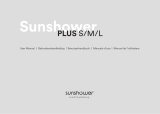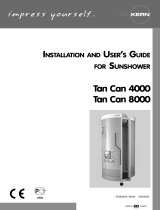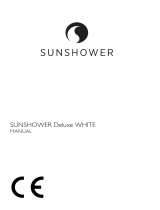Page is loading ...

4
Introduction
The sun
The sun supplies various types of energy. Visible light enables us to see, ultraviolet (UV) light gives us a tan and the infrared (IR) light in sunlight
provides the heat in which we like to bask.
The tanning appliance
With this tanning appliance you can suntan comfortably at home. The tanning lamps emit visible light, heat and ultraviolet light, giving you the
impression you are sunbathing in real sunlight. The special UV lter only passes the light that is required to get a tan.
The tanning lamps emit sufcient infrared to provide a comfortable warmth.
A timer ensures that each session does not last longer than 45 minutes. Just as with natural sunlight, overexposure must be avoided (see the
chapter ‘Tanning and your health’).
General description (Fig. 1)
A Wheels
B Mains cord in storage compartment
C Handgrip
D Timer
E Memory knobs (for two persons)
F Slides
G Stand
H Locking collar for height adjustment
I Locking collar for lamp unit
J Handgrip
K Fan (cooling)
L Lamp unit
M UV lter
N Tanning lamps (type Philips HPA expower 400-600)
O Reector
P Measuring tape
Q Protective goggles (2 pairs)
(type no. HB071/service no. 4822 690 80123)
R Base
S Type plate
Important
Read these instructions for use carefully before using the appliance and save them for future reference.
Check if the voltage indicated on the appliance corresponds to the mains voltage in your home before you connect the appliance.
The appliance must be connected to a circuit that is protected with a 16A standard fuse or a slow-blow automatic fuse.
If the wall socket used to power the appliance has poor connections, the plug of the appliance will become hot. Make sure you plug the
appliance into a properly connected wall socket.
If the mains cord is damaged, it must be replaced by Philips, a service centre authorised by Philips or similarly qualied persons in order
to avoid a hazard.
Water and electricity are a dangerous combination! Do not use this appliance in wet surroundings (e.g. in the bathroom or near a shower
or swimming pool).
If you have just been swimming or have just taken a shower, dry yourself thoroughly before using the appliance.
Make sure children do not play with the appliance.
Always unplug the appliance after use.
Let the appliance cool down after use for approx. 15 minutes before folding it back into transport position and storing it.
Only move the appliance when it is in transport position.
Make sure the vents in the lamp unit and in the base remain open during use. Keep your hair away from the air inlet of the lamp unit.
The appliance has been tted with an automatic protection against overheating. If the appliance is insufciently cooled (e.g. because the
vents are covered), the appliance will switch off automatically. Once the cause of overheating has been removed and the appliance has
cooled down, the appliance will switch on automatically again.
The appliance contains hinging parts, so be careful not to get your ngers stuck between these parts.
Do not exceed the recommended tanning time and the maximum number of tanning hours (see ‘Tanning sessions: how often and how
long?’).
Do not choose a tanning distance of less than 65 cm.
Do not tan a particular part of your body more than once a day. Avoid excessive exposure to natural sunlight on the same day.
Do not take a tanning session if you have a disease and/or use medication or cosmetics that increase the sensitivity of your skin. Be extra
careful if you are hypersensitive to UV light. Consult your doctor in case of doubt.
Do not use the tanning appliance and consult your doctor if unexpected effects such as itching occur within 48 hours after the rst
session.
The appliance is not to be used by people who get sunburnt without tanning when exposed to the sun, by persons suffering from
sunburn, by children, or by persons who suffer (or have previously suffered) from skin cancer or who are predisposed to skin cancer.
Consult your doctor if persistent lumps or sores appear on the skin, or if there are changes in pigmented moles.
Always wear the protective goggles provided with the appliance while tanning to protect your eyes against overexposure (also see the
chapter ‘Tanning and your health’).
Remove creams, lipstick and other cosmetics well in advance of a tanning session.
Do not use any sunscreens or suntan accelerators.
If your skin feels taut after the tanning session, you may apply a moisturising cream.
Never use the appliance when the UV lter is damaged, broken or missing or when the timer is defective.
The UV lter becomes hot during the tanning session. Do not touch it.
Colours may fade under the inuence of the sun. The same effect may occur when using this appliance.
Do not expect the appliance to yield better results than the natural sun.
-
,
,
,
,
,
,
,
,
,
,
,
,
,
,
,
,
,
,
,
,
,
,
,
,
,
,
,
,
ENGLISH

Electromagnetic elds (EMF)
This Philips appliance complies with all standards regarding electromagnetic elds (EMF). If handled properly and in accordance with the
instructions in this instruction manual, the appliance is safe to use according to scientic evidence available today.
Tanning and your health
Just as with natural sunlight, the tanning process will take some time. The rst effect will only become visible after a few sessions (see chapter
“Tanning sessions: how often and how long?”).
Overexposure to ultraviolet light (natural sunlight or articial light from your tanning appliance) can cause sunburn.
Besides many other factors, such as overexposure to natural sunlight, incorrect and excessive use of a tanning appliance may increase the risk of
skin and eye problems. The degree to which these effects occur is determined by the nature, intensity and duration of the exposure on the one
hand and the sensitivity of the person involved on the other.
The more the skin and the eyes are exposed to UV light, the higher the risk of keratitis, conjunctivitis, damage to the retina, cataracts, premature
skin ageing and the development of skin tumours will be. Some medications and cosmetics increase the sensitivity of the skin.
Therefore it is highly important:
that you follow the instructions in the chapters ‘Important’ and ‘Tanning sessions: how often and how long?’;
that the tanning distance (distance between the UV lter and the body) is 65 cm.
that you do not exceed the maximum number of tanning hours per year (i.e. 19 hours or 1140 minutes);
that you always wear the goggles provided while tanning.
Tanning sessions: how often and how long?
Do not take more than one tanning session per day, over a period of ve to ten days.
Allow an interval of at least 48 hours between the rst and the second session.
After this 5- to 10-day course, we advise you to give your skin a rest for a while.
Approximately one month after a course, your skin will have lost much of its tan. You can then start a new course.
If you want to keep your tan, do not stop tanning after the course, but continue taking one or two tanning sessions a week.
Whether you choose to stop tanning for a while or whether you continue tanning on a lower frequency, always keep in mind that you
must not exceed the maximum number of tanning hours.
For this appliance the maximum is 19 tanning hours (=1140 minutes) a year.
Example
Suppose you take a 10-day tanning course, with a 7-minute session on the rst day and a 20-minute session on the nine following days.
The entire course will then last (1 x 7 minutes) + (9 x 20 minutes) = 187 minutes.
This means you can take 6 of these courses in a year, as 6 x 187 minutes = 1122 minutes
Of course, the maximum number of tanning hours applies to each separate part or side of the body that is tanned (e.g. the back and front of
the body).
As is shown in the table, the rst session of a tanning course should always last 7 minutes, irrespective of the sensitivity of the skin.
If you think that the sessions are too long for you (e.g. because your skin feels taut and tender after the session), we advise you to reduce
the length of the sessions by e.g. 5 minutes.
For a beautiful all-over tan, turn your body slightly during the session so that the sides of your body are better exposed to the tanning light.
Duration of the UV session for
each separately treated part of the
body
For persons with very sensitive
skin
For persons with normal
sensitive skin
For persons with less sensitive
skin
1st session 7 minutes 7 minutes 7 minutes
rest of at least 48 hours
2nd session 10 minutes 20 - 25 minutes 30 minutes*
3rd session 10 minutes 20 - 25 minutes 30 minutes*
4th session 10 minutes 20 - 25 minutes 30 minutes*
5th session 10 minutes 20 - 25 minutes 30 minutes*
6th session 10 minutes 20 - 25 minutes 30 minutes*
7th session 10 minutes 20 - 25 minutes 30 minutes*
8th session 10 minutes 20 - 25 minutes 30 minutes*
9th session 10 minutes 20 - 25 minutes 30 minutes*
10th session 10 minutes 20 - 25 minutes 30 minutes*
*) or longer, depending on your skin sensitivity.
If your skin feels slightly taut after tanning, you can apply a moisturising cream.
Preparing for use
The appliance can be easily moved in transport position. (Fig. 2)
The appliance is easier to lift if you do so together with another person.
If you have to lift the appliance by yourself, use the handle. (Fig. 3)
1 To open the appliance, move the slides in the direction of the arrow. (Fig. 4)
2 Pull the stand and the lamp unit up. (Fig. 5)
3 Put the tanning appliance in the position indicated. (Fig. 6)
4 Pull the lamp unit up to horizontal position. Use the handle to do this. (Fig. 7)
-
-
-
-
,
,
,
,
,
,
,
-
-
,
,
ENGLISH 5

You will hear clicks when you move the lamp unit past certain xed positions.
Instead of using the above step-by-step method, you can also pull the lamp unit up by its handle in one single movement. (Fig. 8)
5 Turn the lamp unit a quarter turn. (Fig. 9)
6 Place the tanning appliance beside a bed as indicate in the gure. (Fig. 10)
The distance between the UV lter and the surface on which you are lying down (e.g. the bed), must be 85 cm.
7 Loosen the height adjustment lock by sliding the collar down the stand. Pull the lamp unit up at the same time to a height of 85 cm
above the bed. (Fig. 11)
Let go of the collar to lock the lamp unit into position.
You can check the distance between the lamp unit and the bed by pulling out the measuring tape.
The measuring tape will automatically rewind if you move the red tab sideways.
The appliance is now ready for use.
Using the appliance
1
Fully unwind the mains cord.
2 Put the plug in the wall socket.
Consult the table in these instructions for use and your own notes.
Put on the protective goggles provided.
The protective goggles should only be used when tanning with a Philips tanning appliance. They should not be used for other purposes. The
protective goggles comply with protection class II according to directive 89/686/EEC.
3 Set the timer to the appropriate time for the tanning session. (Fig. 12)
4 Lie down under the lamp unit.
The timer will automatically switch the tanning appliance off when the set tanning time has elapsed.
The timer can be set to a maximum tanning time of 45 minutes.
During the last minute of the session you will hear a beeping sound.
During this minute you can reset the timer to tan the other side of your body. By doing so, you avoid the 3-minute waiting time which is
necessary to allow the tanning lamps to cool down after they have been switched off.
After the tanning session
1 Keep track of the number of sessions you have had by means of the memory knobs. The appliance has two memory knobs: one for each
person. (Fig. 13)
Cleaning
1
Always unplug the appliance and let it cool down before you start cleaning it.
2 Clean the outside of the appliance with a damp cloth.
3 Clean the protective goggles with a moist cloth.
Do not let any water run into the appliance.
4 Do not use any scouring agents or scouring pads.
Never use abrasive liquids like scourers, petrol or acetone to clean the appliance.
You can clean the outside of the UV lter with a soft cloth sprinkled with some methylated spirits.
Storage
1
Let the appliance cool down for 15 minutes before you put it in transport position and store it.
In the meantime, you can wind up the cord and put it in the base of the appliance.
2 Make sure the cord is stored properly and does not get stuck between the hinging parts of the appliance when you put the appliance in
transport position.
3 Loosen the height adjustment lock by sliding the collar down the stand. Push the stand down at the same time. Then let go of the collar.
(Fig. 14)
4 Turn the lamp unit a quarter turn. (Fig. 15)
5 Lift the lamp unit a little with one hand and unlock it by pushing the two unlocking slides down with your other hand. (Fig. 16)
6 Hold the two unlocking slides down with one hand and fold the lamp unit into vertical position with your other hand. Then let go of the
unlocking slides. (Fig. 17)
7 Lower the stand and the lamp unit carefully onto the base of the appliance. (Fig. 18)
8 Lock the lamp unit onto the base by pushing the slides on the base in the direction of the arrow. (Fig. 19)
9 The tanning appliance can be stored under a bed. (Fig. 20)
10 It can also be stored in a cupboard in upright position. (Fig. 21)
Replacement
The light emitted by the tanning lamps will become less bright in time (i.e. after a few years in case of normal use). When this happens, you will
notice a decrease in the tanning capacity of the appliance. You can solve this problem by setting a slightly longer tanning time or by having the
tanning lamps replaced.
The UV lter protects against exposure to undesired UV light. It is therefore important to have a damaged or broken lter replaced right away.
Have the tanning lamps (Philips HPA expower 400-600), the UV lter and the cord replaced by a dealer or service centre authorised by
Philips. Only they have the knowledge and skills required for this job and the original spare parts for the appliance.
,
,
,
-
-
,
,
,
,
ENGLISH6

Environment
Do not throw the appliance away with the normal household waste at the end of its life, but hand it in at an ofcial collection point for
recycling. By doing this you will help to preserve the environment. (Fig. 22)
The lamps of the appliance contain substances that can be harmful to the environment. When you discard the lamps, do not throw them away
with the normal household waste but hand them in at an ofcial collection point.
Guarantee & service
If you need service or information or if you have a problem, please visit the Philips website at www.philips.com or contact the Philips Customer
Care Centre in your country (you will nd its phone number in the worldwide guarantee leaet). If there is no Customer Care Centre in your
country, turn to your local Philips dealer or contact the Service Department of Philips Domestic Appliances and Personal Care BV.
Guarantee restrictions
The tanning lamps are not covered by the terms of the international guarantee.
Troubleshooting
The appliance may fail to work properly because it has not been installed or is not used in accordance with the instructions. In that case you are
able to solve the problem yourself by following the troubleshooting tips below.
Problem Solution
The appliance does not start The lamp unit has not been put in the right position (see chapter ‘Preparing for use’.
The plug has not been properly inserted into the wall socket.
Perhaps there is a power failure. Check by means of another appliance.
The lamps are still too hot to go on. Let them cool down for 3 minutes rst.
The appliance was not sufciently cooled and the overheating protection switched the appliance
off automatically. Remove the cause of overheating (e.g. remove a towel that is blocking one or
more vents). Wait for 10 minutes and switch the appliance back on.
The fuse cuts off the power when you
switch on the tanning appliance or during
use.
Check the fuse of the circuit to which the tanning appliance is connected. The correct fuse type
is a 16A standard fuse or a slow-blow automatic fuse. The fuse may also blow because you have
connected too many appliances to the same circuit.
Poor tanning results You are not following the tanning schedule suitable for your skin type. Check the table in ‘Tanning
sessions: how often and how long?’.
The distance between the lamps and the surface you lie on is larger than prescribed.
When the lamps have been used for a long time, the UV light emitted will decrease. This effect
only becomes noticeable after several years. You can solve this problem by selecting a longer
tanning time or by having the lamps replaced.
,
ENGLISH 7
/


